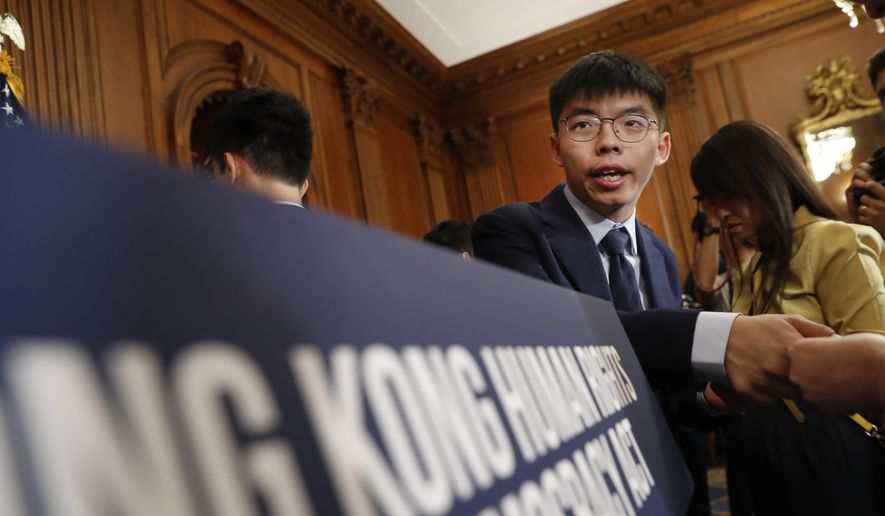Pro-democracy activists from Hong Kong traveled to Capitol Hill this week with an impassioned plea to lawmakers to block U.S. sales of police equipment to the city’s police forces, saying the ban will help curb human rights abuses as the Chinese government seeks to crack down on a summer of protests in the semi-autonomous city.
In a hearing before the Congressional-Executive Commission on China, activists told the bipartisan group of House and Senate lawmakers that Hong Kong has turned into a “police state” where ordinary civilians and even children are being victimized.
“The present state of affairs reveals Beijing’s utter inability to understand, let alone govern, a free society,” said Joshua Wong, a 22-year-old student activist who has gained international fame as secretary-general of pro-democracy party Demosisto in Hong Kong.
Denise Ho, a popular singer who has emerged as a leading democracy and LGBTQ activist, told the commission Tuesday, “This is not a plea for so-called ‘foreign interference.’ This is a plea for democracy.”
It was the first Washington appearance for many of the Hong Kong advocates, whose protests have rocked the prosperous former British colony and posed a major political challenge for the communist regime in Beijing.
Congress is currently considering several bills that would require human rights reports on Hong Kong, sanction those responsible for “the erosion of Hong Kong’s autonomy,” and bar the sale of equipment such as rubber bullets, pepper spray and tear gas to Hong Kong’s security forces.
“Hopefully, we will be able to pass some of this legislation to make it clear to the regime in Beijing that democracy is an important value,” said Sen. Angus King, Maine independent.
China has attacked the legislation as unacceptable interference in its domestic affairs.
Chinese Foreign Ministry Hua Chunying told reporters Tuesday that foreign nations to “pull out their dirty hands from Hong Kong.”
The protests in Hong Kong, which have turned violent on several occasions, began in earnest in June when Hong Kong’s Beijing-appointed city administrator pushed an extradition bill — since withdrawn — that critics said would put residents of Hong Kong at risk of being sent to China, where they could face justice in the mainland’s legal system.
But the demonstrations quickly took on a wider scope, with demands for free elections and greater civil liberties.
The situation escalated last month when Chinese President Xi Jinping ordered military forces to begin massing near the mainland’s border with Hong Kong. The move sparked fears of a crackdown akin to the 1989 massacre of pro-democracy demonstrators in Beijing’s Tiananmen Square.
In a separate briefing Tuesday afternoon in Washington, additional Hong Kong activists offered first-hand accounts of what protesters on the front lines have been facing since June. The activists concealed their identities and covered their faces in masks, goggles, sunglasses and yellow construction hats for fear they would face punishment upon their return to Hong Kong.
One activist, who requested only to be named as “LV,” said she has witnessed “emotionally charged police using excessive force, brutally beating the heads of those who have already surrendered with batons.”
At the conversation hosted by Freedom House, a pro-democracy watchdog organization, LV explained that her “biggest fear on the front line is seeing my fellow protesters fallen … and beaten, but I have to abandon them and keep running so I won’t be caught also.”
“Otherwise,” she added, “there would be one less person less in the next protest.”
Nathan Law, a 26-year-old activist and a founder of the Demosisto party, said the Hong Kong police use excessive force because the Chinese government “grants them the permission.”
Mr. Law, who has been nominated for a Nobel Peace Prize, warned that “if [authoritarianism] prevails, … then what is happening to Hong Kong is exactly what [will] happen to the world.”
• Lauren Toms can be reached at lmeier@washingtontimes.com.




Please read our comment policy before commenting.